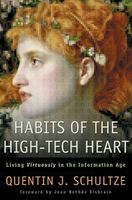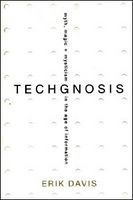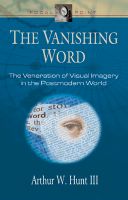But these authors ask serious questions and raise important issues, even if they are not entirely groundbreaking in themselves (i.e, McLuhan, Postman). Knowing the impulse behind our over-indulgence in visuals and information technologies breaks their spell and lessens their power over us, so we're told. Hunt's book is the easier read (I've finished it), but the other two will need strong coffee to get me through them...after I've turned off the computer.

"Although information technologies increase our capacity for acquiring and disseminating information, the resulting informational practices actually foster individualism and self-interest over community and responsibility. Information technologies are not just tools but also value-laden techniques that we rely on increasingly to organize and understand nearly every aspect of our lives. As Jacques Ellul argues, this technological-mindedness is essentially a faith in la technique, the means of efficiency and control. The cover of Business Week shouts in large type, "The Infotech 100: Efficiency Rules! Who's Got It. Who's Selling It." Today, we increasingly assume that doing things quickly and effectively is more important than doing them carefully, thoughtfully, and ethically. As a result, much of our daily communication slips into junk messaging - the informational equivalent of junk food. While we gain access to more information and speedier means of messaging, we also weaken the kinds of shared practices, such as neighborliness and hospitality, that we need to maintain our moral bearings. Our manner of informational living deflates our moral character."Habits of the High-Tech Heart
Quentin J. Schultze
.......................

"Certainly Hermes would approve the Internet, a mercurial network of far-flung messages that functions as a marketplace of ideas and commodities. Accessed through the domestic threshold of home computers, the Net opens up technological liminal zone that swamps the self with new paths of possibility. Indeed, the mythic attraction of the Net turns on some of the very same qualities associated with the youthful trickster: speed, profit, innovative interconnection, the overturning of established orders. Of course, the information superhighway is also "mythic" in the modern and critical sense of the term: a strategic distortion, a mirage, a social lie. The utopian rhetoric of the Internet paves over a host of troubling issues: the hidden machinations of new corporate media powers, the potentially atomizing effects of the terminal screen on social and psychological life, and the bedeviling issue of access, as communication technologies hardwire the widening global gap between rich and poor. But Hermes prepares us for such dangers, because the merchant of messages traffics with deception: He lies and steals, and his magic wand closes human eyes forever, drawing us into the deep sleep of forgetting."TECHGNOSIS
Erick Davis
.......................

Although today it has become fashionable for scholars of human communication and spokespeople of the entertainment industry to minimize the power of the mass media, Hitler and his minister of propaganda, Joseph Goebbels, did not minimize it. To the contrary, once Hitler became Chancellor he sought to lay his hands on every media form in Germany – art, radio, the press, and film. Whereas the propaganda of the Nuremberg rallies were like annual shots in the arm, post-1933 propaganda became total under National Socialism. Goebbels, whose doctoral thesis analyzed Romantic Drama, asserted, “In propaganda as in love, anything is permissible which is successful.” Two days after his appointment to the Ministry of Popular Enlightenment and Propaganda, the little sophist said, “It is not enough to reconcile people more or less to our regime, to move them towards a position of neutrality towards us, we would rather work on people until they are addicted to us.” Goebbels made this statement in March 1933. In May he stood before a bonfire of burning books and declared, “The age of extreme intellectualism is over...the past is lying in flames...the future will rise from the flames within our hearts.” Book burning was just one aspect of the anti-intellectualism associated with Nazism. This was an attitude of the Hitler Youth. A member of the exiled Social Democratic Party observed, “[The] new generation has never had much use for education and reading. Now nothing is demanded of them; on the contrary, knowledge is publicly condemned.”The Vanishing Word
Arthur Hunt III

No comments:
Post a Comment